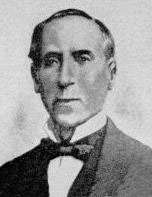James Spriggs Payne
James Spriggs Payne (December 19, 1819 – January 31, 1882) served as the fourth and eighth President of Liberia, from 1868 to 1870 and from 1876 to 1878.[1] He was the last president to belong to the Republican Party.
James Spriggs Payne | |
|---|---|
 | |
| 4th President of Liberia | |
| In office January 6, 1868 – January 3, 1870 | |
| Vice President | Joseph Gibson |
| Preceded by | Daniel Bashiel Warner |
| Succeeded by | Edward James Roye |
| 8th President of Liberia | |
| In office January 3, 1876 – January 7, 1878 | |
| Vice President | Charles Harmon |
| Preceded by | Joseph Jenkins Roberts |
| Succeeded by | Anthony W. Gardiner |
| Personal details | |
| Born | December 19, 1819 Richmond, Virginia, United States |
| Died | January 31, 1882 (aged 62) Monrovia, Liberia |
| Political party | Republican |
Early life
Payne was born in Richmond, Virginia, in 1819 to free mixed-race parents. Payne grew up in a deeply religious Methodist family and was a devout Christian.[2] His father, David M. Payne, was a Methodist minister and was ordained a deacon by the Virginia Conference in 1824.[3] Payne was noted for having a rather light complexion, with some estimates claiming that he was indeed an octoroon—having seven-eights European ancestry and one-eighth African ancestry. When Payne was ten years old, his family emigrated to Liberia on the ship The Harriet, the same ship as Joseph Jenkins Roberts, Liberia's future first president, under the auspices of the American Colonization Society.[4]
Aside from religion, the young Payne showed interest in politics and economics. He later became a successful writer in these areas.[2] As an adult, he was appointed by the Liberian government to work to complete the severance of Liberia's ties to the American Colonization Society.[2]
Political career
Payne was elected as the fourth president of Liberia in 1868 and served a single two-year term. During his presidency, he worked to end the slave trade that still took place along Liberia's coast.[2]
Payne improved government relations with the native communities and peoples, whom he believed the newer settlers and politicians had for the most part ignored.[2]
He worked to extend Liberia's trading and political ties with Europe.[5]
Payne was elected a second time in 1876, again serving a single two-year term. Escalating economic difficulties began to weaken the state's dominance over the coastal indigenous population. When the financially burdened ACS withdrew its support from the colony in the years after the American Civil War, conditions worsened as Liberia struggled to modernize its largely agricultural economy. The cost of imported goods was far greater than the income generated by the nation's exports of coffee, rice, palm oil, sugarcane, and timber. As a result, Payne made efforts to increase the country's foreign trade.
Later life and family
On leaving political office in 1878, Payne continued his lifelong involvement in church work. In 1880, he was the Liberian delegate at the General Conference of the Methodist Episcopal Church in Cincinnati, Ohio.[2] The next year, he was elected president of the Methodist Annual Conference of Liberia.[2] James Spriggs Payne died in Monrovia in 1882.
Legacy and honors
- In January 1882, he was awarded an honorary doctor of divinity degree by Liberia College (now University of Liberia) for his life achievements.[2]
- Spriggs Payne Airport in the Monrovia area is named after him.
- Besides Payne's descendants in Liberia, the Krio branch of the Blyden family are descended from Payne through his granddaughter Anna Erskine, who was the partner of Edward Wilmot Blyden.
References
- Jesse N. Mongrue, Liberia: America's Footprint in Africa: Making the Cultural, Social, and Political Connections, iUniverse.com, 2013, p. 72.
- "Payne, James Spriggs", Dictionary Of African Christian Biography
- Melton (2007), p. 58.
- "Roll Of Emigrants That Have Been Sent To The Colony Of Liberia, Western Africa, By The American Colonization Society And Its Auxiliaries, To September 1843" Archived 2008-07-05 at the Wayback Machine
- Thomas Morris Chester & R. J. M. Blackett, Thomas Morris Chester, Black Civil War Correspondent.
Sources
- Melton, J. Gordon, A Will to Choose: The origins of African American Methodism, Rowman & Littlefield, 2007, ISBN 0-7425-5265-9
| Political offices | ||
|---|---|---|
| Preceded by Daniel Bashiel Warner |
President of Liberia 1868–1870 |
Succeeded by Edward James Roye |
| Preceded by Joseph Jenkins Roberts |
President of Liberia 1876–1878 |
Succeeded by Anthony W. Gardiner |
